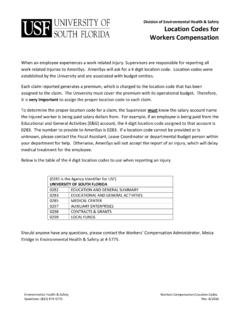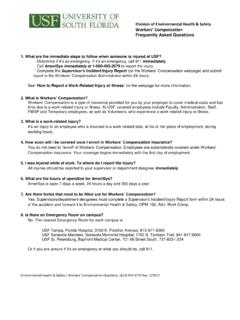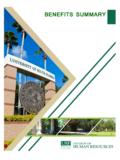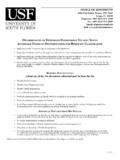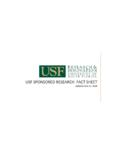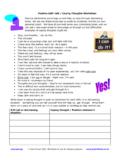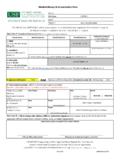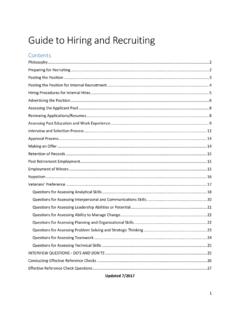Transcription of Group Treatment Manual - University of South Florida
1 Group Treatment Manual Edited by Colleen Clark, Ph. D. & Fred Fearday, LCSW ii Contents Fred Fearday Colleen Clark 1 Part I: Getting Comfortable With Yourself 15 Chapter 1: Empowerment Building Safety Fred Fearday 15 Chapter 2: Mind, Body, and Emotions Margo Fleisher-Bond 29 Chapter 3: How Mind and Emotions Work Together Margo Fleisher-Bond 37 Chapter 4: What It Means to Be a Female Gigi Cabrera 44 Part II: Interpersonal Effectiveness Having Healthy Relationships with Yourself and Others 49 Chapter 5.
2 Assertive Communication Margo Fleisher-Bond 49 Chapter 6: Trust and Intimacy Fred Fearday 58 Chapter 7: Boundaries Carol Parker 67 Chapter 8: Social Support Fred Fearday 72 Part III: Emotional Feeling Good 77 Chapter 9: Controlling Cravings and Urges Margo Fleisher-Bond & Sharon Slavin 77 Chapter 10: Self-Esteem George Thomas 83 Chapter 11: Self-Soothing Margo Fleisher-Bond & Sharon Slavin 89 Chapter 12: Acceptance and Healing Carol Parker 94 Triad Women s Group Table of Contents iii Part IV: Distress Staying Healthy in a Stressful World 101 Chapter 13: Problem Solving George Thomas 101 Chapter 14: Dealing with Violence Michelle Levasseur 105 Chapter 15: Crisis Management and Recovery Margo Fleisher-Bond & Sharon Slavin 118 Chapter 16.
3 Relapse and Recovery Fred Fearday 122 127 APPENDICES A. Principles of Clinical Interventions 129 B. The Development and Course of Co-occurring Disorders and the Impact of Violence 137 C. DSM-IV Criteria for Substance Abuse and Dependence 139 D. List of Handouts 141 E. Recommended Resources: Books and Web Addresses 142 F.
4 The 12 Steps of Alcoholics Anonymous 147 G. Workbook for Success 149 Triad Women s Group Table of Contents iv ACKNOWLEDGEMENTS The Editors would like to acknowledge and thank the members of the Triad Women s Project s Clinical Interventions Committee for their hard work and collaboration in developing this Manual . All members made important contributions to the work of the committee and to this Manual . The committee members and their association at the time were.
5 We wish to particularly thank Michelle Levasseur of the University of South Florida who did much of the original work of compiling and organizing the Manual . Other authors and collaborators include: Gigi Cabrera, Tri-County Humans Services, Florida Center for Addictions and Dual -Disorders (FCADD) Colleen Clark, University of South Florida , Louis de la Parte Florida Mental health Institute (USF/FMHI) Arthur J. Cox, Sr., FCADD & Mid- Florida Center for Mental health and Substance Abuse Services, Inc. Leanne Crumley, Winter Haven Hospital, Behavioral health Division Dianne Doty, consumer/survivor/recovering person (C/S/R person) Michelle Levasseur, USF/FMHI Fred Fearday, USF/FMHI Margo Fleisher-Bond, FCADD Mollie McDevitt, C/S/R person Carol Parker, Trauma Services Consultant Sharon Slavin, FCADD George Thomas, USF/FMHI For offering valuable feedback, we would like to thank all of the C/S/R women who have participated on the Triad Women s Project Consumer Advisory Board and the women who participated in the groups.
6 We would also like to thank the facilitator-trainers of the pilot groups, Margo Fleisher-Bond and Carol Parker, for their expertise and willingness to train others. We especially want to acknowledge Joel Mixon, Carrie Wagner, and Debby Morriss (USF/FMHI) for tirelessly formatting and editing the material. This Manual was funded under Guidance for Applicants (GFA) No. TI 98-004 entitled Cooperative Agreement to Study Women with Alcohol, Drug Abuse and Mental health (ADM) Disorders who have Histories of Violence from the Department of health and Human Services, Public health Service, Substance Abuse and Mental health Services Administration's three centers: Center for Substance Abuse Treatment , Center for Mental health Services and Center for Substance Abuse Prevention (March 1998).
7 Colleen Clark Fred Fearday Triad Women s Group Acknowledgements v The University of South Florida Founded in 1956, the University of South Florida has become the second largest University in the southeast , with a student body of 36,000 on campuses in Tampa, St. Petersburg, Sarasota-Manatee and Lakeland, as well as its centers in downtown Tampa, New Port Richey and northern Pinellas County. It offers nearly 200 programs at the undergraduate, master s, specialty and doctoral levels, including the USF counts 73 Fulbright Scholars and 42 endowed chairs among its faculty.
8 Louis de la Parte Florida Mental health Institute The Louis de la Parte Florida Mental health Institute at the University of South Florida has a mission to strengthen mental health services throughout the state. The Institute provides research, training, education, technical assistance, and support services to mental health professionals and agencies as well as consumers, consumer organizations, and behavioral health advocates statewide. At the state level, the Institute works closely with the Departments of Children and Families (DCF), Corrections (DOC), Elder Affairs (DOEA), Education (DOE), and the Agency for health care Administration (AHCA), as well as with members and staff of the State Legislature and providers of mental health services throughout Florida .
9 Comprised of three primary research departments, Mental health Law & Policy, Child & Family Studies, and Aging & Mental/ health and a number of specialized centers, the Institute conducts research and program evaluations, provides training and consultations, and offers a number of academic courses at the masters and doctoral levels. The Department of Mental health Law & Policy This Department's mission is to conduct research, consult, teach, and organize training to enhance the quality of life for individuals impacted by their environment, mental illness, or substance use.
10 Research is conducted on critical and emerging issues surrounding the funding, delivery, and outcomes of public behavioral healthcare and the civil and criminal justice systems. Faculty conducts research to validate best practices and to encourage their implementation in community settings. Consultation is provided to a variety of state agencies, including the Department of Children and Families, the Office of Court Administration, the Department of Juvenile Justice, the Department of health , and the Department of Corrections. The Department s focus is on those areas where law and public policy intersect with behavioral health services and spans a wide range of topics and specialties.
